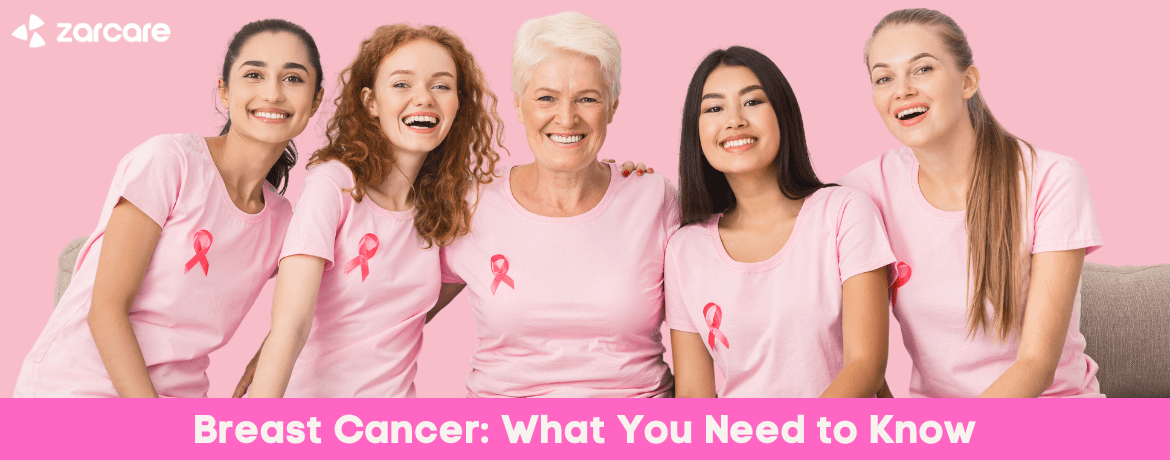Breast Cancer: What You Need to Know

Breast cancer is a topic that many people are familiar with, but several lesser-known facts are crucial for a comprehensive understanding. Here’s what you need to know about breast cancer, emphasising uncommon information that can make a significant difference. While a lump in the breast is the most well-known symptom of breast cancer, other signs are less commonly discussed but equally important to recognise: Look out for dimpling, redness, or an orange-peel texture on the breast skin. These changes can indicate inflammatory breast cancer, a rare but aggressive form of the disease². Any unexplained nipple discharge, inversion, or changes in the appearance of the nipple should be checked by a healthcare professional². Swelling or lumps around the collarbone or underarm can occur even before a breast tumour is large enough to be felt². Many people are aware that family history can increase the risk of breast cancer, but other risk factors are less commonly known: Women who received radiation therapy to the chest before the age of 30 have a higher risk of developing breast cancer¹. Long-term use of HRT, especially combined estrogen-progestin therapy, can increase the risk¹. Women with dense breast tissue have a higher risk of breast cancer and may require additional screening methods like MRI¹. Breast cancer is often thought of as a women’s disease, but men can also develop it. Although rare, male breast cancer accounts for about 1% of all breast cancer cases. Men should be aware of the same symptoms and risk factors as women³. While only 5-10% of breast cancers are linked to inherited genetic mutations, understanding your genetic risk can be crucial. Mutations in the BRCA1 and BRCA2 genes significantly increase the risk of breast and ovarian cancers. Genetic testing and counselling can help individuals understand their risk and take preventive measures¹. Certain lifestyle choices can influence breast cancer risk: Even moderate drinking can increase the risk of breast cancer. It’s recommended to limit alcohol intake to reduce risk¹. Regular exercise can help lower the risk of breast cancer. Aim for at least 150 minutes of moderate aerobic activity or 75 minutes of vigorous activity each week¹. A diet rich in fruits, vegetables, and whole grains, and low in processed foods and red meat, can contribute to overall health and potentially lower cancer risk¹. Early detection remains one of the most effective ways to combat breast cancer. Regular mammograms and being aware of changes in your breasts can lead to early diagnosis and better treatment outcomes. Women over 40 should discuss screening options with their healthcare provider and consider annual mammograms². Breast cancer awareness is not just about knowing the common symptoms and risk factors. It’s also about understanding the less obvious signs, genetics’ role, and lifestyle choices impact. By staying informed and proactive, we can improve early detection and treatment outcomes, ultimately saving lives. Remember, if you notice any unusual changes in your breasts or have concerns about your risk factors, consult with a healthcare professional. Early action can make all the difference. ¹: 10 Breast Cancer Facts You Did Not Know | Adventist Health ²: Breast Cancer Symptoms: What You Need to Know | American Cancer Society ³: Breast Cancer Awareness | CDC Stay informed, stay proactive, and support those affected by breast cancer. (1) Breast Cancer Symptoms: What You Need to Know. https://www.cancer.org/cancer/latest-news/breast-cancer-symptoms-what-you-need-to-know.html (2) 10 breast cancer facts you did not know | Adventist Health. https://www.adventisthealth.org/blog/2020/october/10-breast-cancer-facts-you-did-not-know/ (3) Breast Cancer Awareness https://www.cdc.gov/cancer/features/breast-cancer.html (4) Breast Cancer Information & Overview – American Cancer Society. https://www.cancer.org/cancer/types/breast-cancer.html (5) Breast Cancer – Memorial Sloan Kettering Cancer Center. https://www.mskcc.org/cancer-conditions/breast-cancer (6) Getty Images. Beyond the Lump: Uncommon Symptoms
Skin Changes
Nipple Changes
Swelling in Lymph Nodes
Risk Factors You Might Not Know
Radiation Exposure
Hormone Replacement Therapy (HRT)
Dense Breast Tissue
Men and Breast Cancer
The Role of Genetics
Lifestyle Factors
Alcohol Consumption
Physical Activity
Diet
The Importance of Early Detection
Conclusion
Source:
